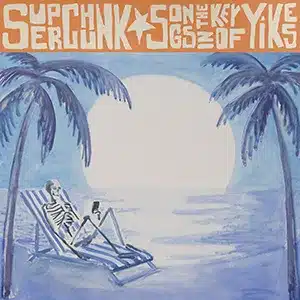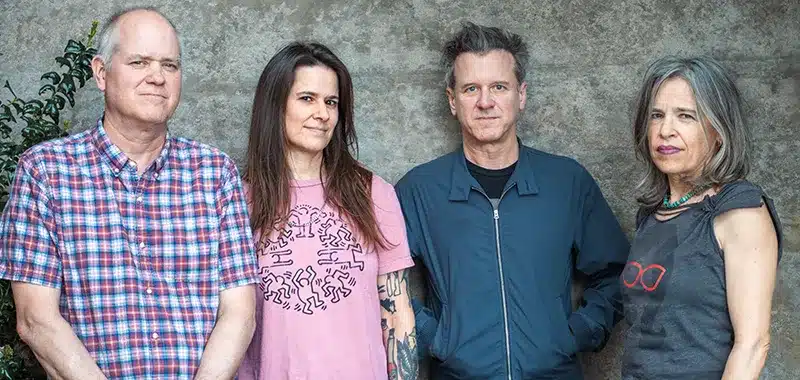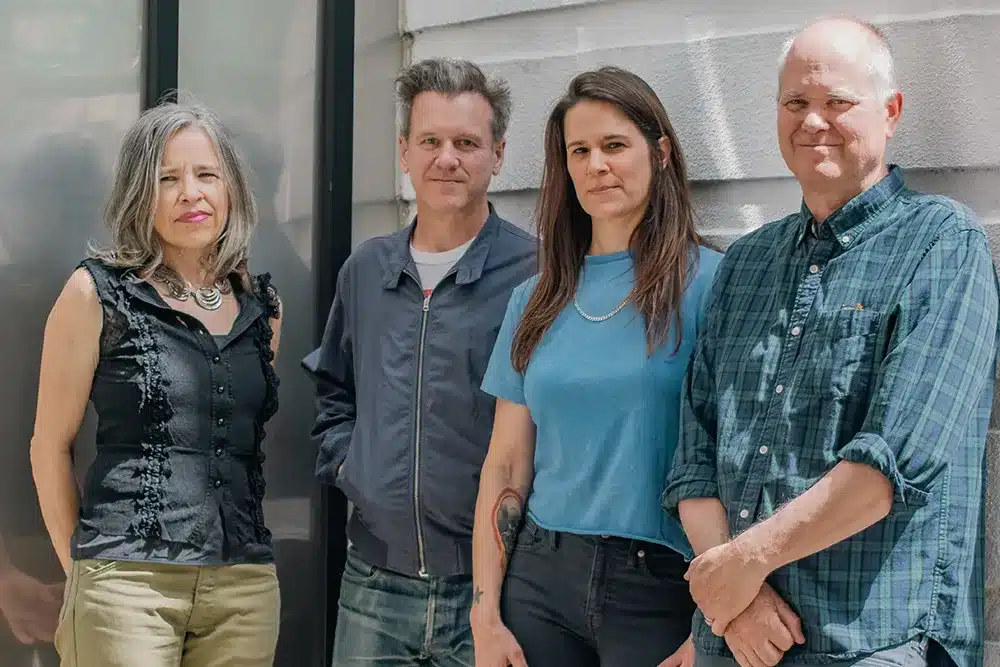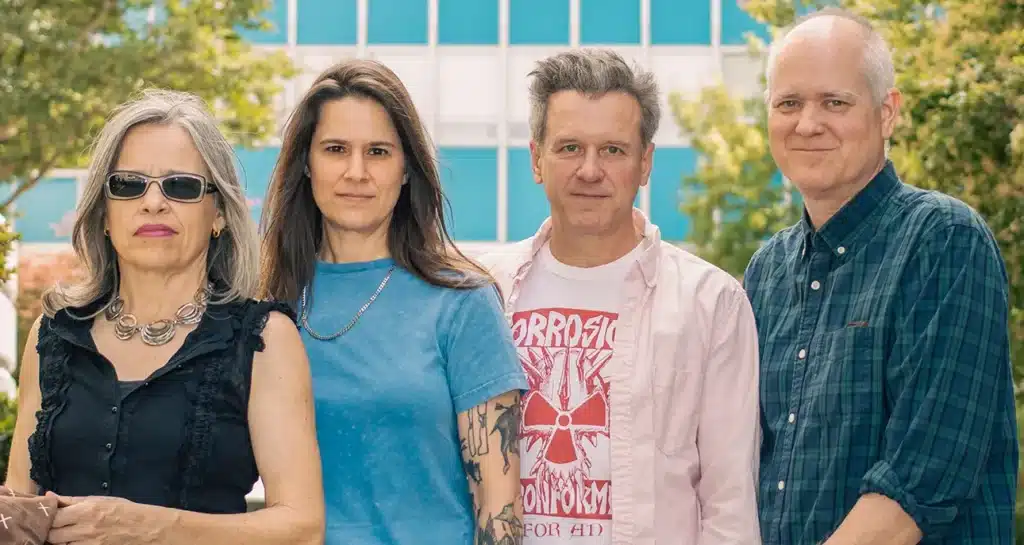
Chapel Hill legends Superchunk continue their remarkable second run on the catchy, political Songs in the Key of Yikes. Mac McCaughan chats with PopMatters.
 Songs in the Key of Yikes Superchunk Merge 22 August 2025
Songs in the Key of Yikes Superchunk Merge 22 August 2025
With a new record called Songs in the Key of Yikes that is populated with songs called “No Hope”, “Everybody Dies”, and “Train on Fire”, it is a reasonable question to ask: What is giving indie rock institution Superchunk hope these days? “I have never had any hope. I was the oldest five-year-old. I was not a happy child. Maybe I’m made to be here in these times, because I’m not engineered for happiness,” explains guitarist Jim Wilbur. “But I do know that I am incredibly lucky, too.”
Lead singer Mac McCaughan has a slightly different take.

“As older people, we have a different view of history than our kids. Sometimes I’m just hopeful that they aren’t flipping out as much as we are. Maybe they know something we don’t. They can see what’s terrible and know how it should be different, so it makes me think that things might be different when they’re in charge. It’s like that line in [What a Time to Be Alive standout] ‘I Got Cut’, ‘All these old men won’t die too soon’. There are still assholes coming up through the ranks, of course, but Mamdani winning the primary gave me hope. Every money interest and mainstream political voice was against him, and the fact that he could win made me think not everyone is just rolling over.”
The record’s title came from McCaughan listening to the Stevie Wonder classic Songs in the Key of Life. “I was thinking about what else sounds like ‘life.’ I sent the title to the band and asked, ‘Is this too stupid or just stupid enough?’ I was surprised by the response from corners who don’t always give a positive reaction,” he says.
“I said it was too stupid,” laughs Wilbur.
Songs in the Key of Yikes splits the difference sonically between the last two records, ten tracks of the agitated pop that has been their calling card, that also continue the political commentary. In short, if you are a diehard fan, you will love it; if you are new to the band, this is also a great point of entry.
Songs like “Train on Fire” and “Bruised Lung” have that classic Superchunk sound, and “Everybody Dies” and “No Hope” continue that political commentary that makes me want to pogo with clenched fists. Take their latest with the fiery, furious What a Time to Be Alive, which was followed up with the more subdued “Now what?” of Wild Loneliness, and it is possible to read them as a trilogy, but it wasn’t planned that way.
“These things don’t reveal themselves until after you have made the records. The songs are just responding to what’s happening at the time. It was not intentional, but I could see how it might seem like that from the outside,” McCaughan explains. This change in tone is also due in part to the way the band records now, compared to their frenetic pace of the 1990s.
“There are differences in how we make records now that allow for more focus on lyrics. In the 1990s, we were making records so fast, it was just like, ‘here are the songs we have. Let’s get them recorded.’ Sometimes the lyrics could wind up being vague because there was pressure to have lyrics and get the songs done. Being in a room together for hours working on a song can result in some great things when you’re just responding to what else is happening, but now, we aren’t just writing records so we can get back out on the road. Everyone’s lives are different, so we just do it differently now.”

Wilbur adds, “The 1990s songs were conceived in such a different way. We would spend hours jamming and throwing things against the wall, and then the lyrics would come together. The songs Mac brings now are more fully formed, and we are thinking more about what we can add to them, and I like it better that way, actually.”
As for the pivot to more direct political messages in the lyrics, McCaughan sees it in part as a continued evolution of his craft. “The lyrics have changed for us because we are always trying to get better as a band, and we always want to be relevant. Our music is usually energetic, and that balances out the lyrical content a little. It doesn’t seem dour. You want to find the spot between timely and timeless,” he shares.
“Not everyone is comfortable writing overtly political music. Someone like [Built to Spill‘s] Doug Martsch isn’t writing lyrics that are explicitly political. Perhaps he’s got political views embedded in the songs, but they aren’t overt. I don’t think it’s anyone’s duty to make political music, but for someone like Ted Leo, it doesn’t seem like he has a choice.”
There are a few vocal artists, such as Leo, Drive-By Truckers, and Bob Mould, among others, but many other bands remain silent. Wilbur doesn’t pass judgment on artists who aren’t making their songs political, or on fans who want to escape. “A lot of people don’t care, or they don’t see it as a role of a band to comment on politics. I would imagine some people are just tired, too, and they don’t want more content on topics they are already getting from the news,” Wilbur adds. “
At first, when I hear a demo, I’m thinking about what to add to make it sound good. It’s not yet about the specific lyrics to me. I’m focused on the melody of the voice. The goal is to be catchy, to be memorable. Not exactly pretty, but something someone would want to hear more than once. And after you come up with a part and then you’re listening to lyrics, it hits,” Wilbur explains.
He continues, “Without sounding arrogant, all artists want their work to have purpose, but the goal is not to sow distress. People still do things that are fun. They still need to laugh. You have to stay alive. You can’t let external circumstances dictate your psychology. I hope our songs help people, but that’s not the intent. Art is for the self; you do it because you have to. You’re not laying benevolence on the masses.”
“People get relief from different things. When Merge put out the Bob Mould record Blue Hearts in 2020, so many people were telling us, ‘This is the record I needed right now,’ but I was listening to a lot of ambient music. You hope that people can find strength from it or relief or release from the art you make, though,” McCaughan explains.

Songs in the Key of Yikes is Superchunk’s first time recording with new drummer Laura King, who has been touring with the band for a while now. Asking King to take on the permanent role was an easy decision. “Laura had been in Mac’s band and had been on the road with us before,” Wilbur explained. “We knew she is a great drummer, and we also knew she is pleasant to have on tour, too,” McCaughan says.
As with other recent Superchunk records, some noteworthy guests join the band for a track or two. Rosali Middleman turns up for “Bruised Lung” and “Everybody Dies”, and members of Merge alums Quivers join the band for “Cue”. Touring bassist Betsy Wright plays on “Care Less”.
“If a song feels like it would be interesting to have a different voice singing with me, then I think, who are the ideals? It also comes down to who has time, too. You’re reliant on who’s available and who’s into it,” McCaughan says. “Since we had to record Wild Loneliness remotely, and it’s so easy to get people to collaborate that way, we thought we might as well get Franklin Bruno and Teenage Fanclub. This time out, we scaled back the contributor list, but it was great to have everyone,” McCaughan says.
Songs in the Key of Yikes was engineered by Paul Voran (The Menzingers, Hurray for the Riff Raff) and Eli Webb, and mixed by Mike Montgomery (The Breeders, Protomartyr), who came with King’s cosign. “Laura said, ‘He already knows how I want my drums to sound.’ The studio was nearby, and it was cool to work somewhere new. The vibe is comfortable and easy. We aren’t looking to go hundreds of miles from home to record like we would have in the 1990s. This way we could work on a few songs, then work again later,” Wilbur says. Mixing remotely is something the band has done since I Hate Music, and although it’s not the fastest way to work, the band was thrilled with Montgomery’s work.
Superchunk will be back on both coasts this fall, and will make a few festival stops to support Songs in the Key of Yikes, and then will go back later to fill in some gaps and hopefully do some international shows. For now, though, Superchunk have given you the perfect soundtrack for these times, perfectly summed up by one of the key lines: “No hope, and we’re still singing.” Do we even have another option?


